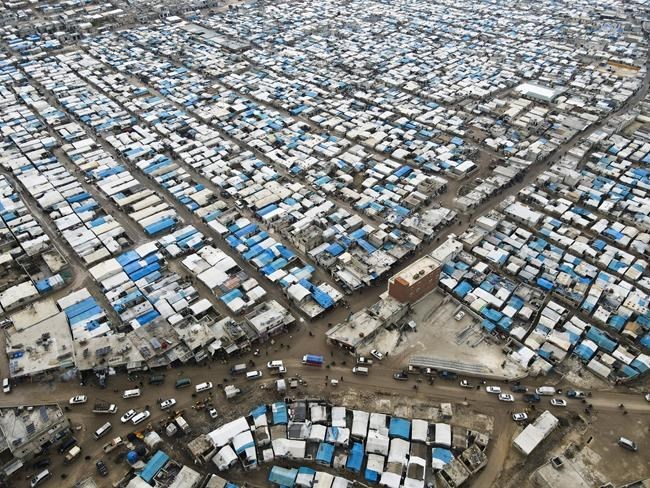
A general view of Karama camp for internally displaced Syrians, is shown Monday, Feb. 14, 2022, by the village of Atma, Idlib province, Syria. THE CANADIAN PRESS/AP/Omar Albam
Republished March 27, 2023 - 1:48 PM
Original Publication Date March 27, 2023 - 1:06 AM
OTTAWA - A judge's erroneous direction that Canadian officials should secure the release of four men from detention in northeastern Syria amounts to a "wholesale expansion" of the law, a federal lawyer told an appeal hearing Monday.
Lawyer Anne Turley said the decision creates a new right to be returned to Canada, or even be rescued by Ottawa, when a citizen finds themselves in trouble abroad, despite no involvement of Canada in the foreign detention.
Turley made the argument while asking a Federal Court of Appeal panel to overturn a January ruling by Federal Court Justice Henry Brown.
The Court of Appeal reserved its decision until a later date at the conclusion of the one-day hearing Monday, indicating a judgment would come soon.
In his ruling, Brown said Ottawa should request repatriation of the men in Syrian prisons run by Kurdish forces as soon as reasonably possible and provide them with passports or emergency travel documents.
Brown ruled the men are also entitled to have a representative of the federal government travel to Syria to help facilitate their release once their captors agree to hand them over.
Federal lawyers argue Brown's expansive approach overshoots the text, purpose and protected interests of the Charter of Rights and Freedoms guarantee that citizens can enter Canada, and is inconsistent with established domestic and international law.
The government also contends in written arguments that the court usurped the role of the executive over matters of foreign policy and passports. "The mandatory actions fail to respect the proper role of the executive and prevent it from making necessary, timely and individualized assessments within its expertise about a range of complex considerations."
The judge's ruling has largely been put on hold while the appeal plays out. However, Ottawa must still get the process started by initiating contact with the Kurdish forces who are detaining the men in a region reclaimed from the Islamic State of Iraq and the Levant.
The four men include Jack Letts, whose parents John Letts and Sally Lane have waged a vigorous campaign to pressure Canada to come to his aid.
Lawyer Barbara Jackman, who represents Letts, points out in a submission to the Court of Appeal that the four Canadian men have not been charged with any crime.
"They have not had access to the necessities of life and have been subjected to degrading, cruel and unusual treatment during their nightmarish tenure in Syrian prisons," the filing says. "Jack Letts told his family and the Canadian government that he was subjected to torture and contemplated ending his own life."
The identities of the three other Canadian men are not publicly known.
Their lawyer, Lawrence Greenspon, says Brown's ruling that Canada should take steps to facilitate repatriation of the men is a practical solution recognizing the Charter-entrenched right of entry.
"Justice Brown’s decision is comprehensive and correct in law," Greenspon's written submission to the Court of Appeal says.
In these rare circumstances, where Canadians are being arbitrarily detained in a foreign country and the federal government has been invited to take steps to facilitate their entry into Canada, the court correctly declared that Ottawa should take those steps, the filing adds.
Greenspon told the Court of Appeal on Monday that nobody is suggesting the Canadian government had anything to do with the fact the men are arbitrarily and indefinitely detained.
But he underscored that the government has the primary responsibility for the ability of its citizens to effectively exercise their mobility rights, meaning it is "very complicit in the continuation of that detention."
Family members of the men, as well as several women and children, argued in the Federal Court proceedings that Global Affairs Canada must arrange for their return, saying that refusing to do so violates the Charter.
The government insisted that the Charter does not obligate it to repatriate the Canadians held in Syria.
However, Greenspon reached an agreement with the federal government in January to bring home six Canadian women and 13 children who had been part of the court action.
In his ruling, Brown said the Canadian men are not able to return home "in part because their government seems never to have formally requested their repatriation.''
They are not able to enjoy "a truly meaningful exercise'' of their Charter right to enter Canada unless and until the federal government makes a formal request to the Autonomous Administration of North and East Syria on their behalf, he wrote.
"Canada must make a formal request for their repatriation because otherwise the Court is asked to construe the Charter in an 'unreal world.'''
A new open letter from more than 100 members of Canada's legal community, including former federal justice minister Allan Rock, says the government must honour Brown's ruling, consistent with Canada's domestic and international law obligations.
They also call on Canada address the underlying deficiencies in policies that have "led to this deplorable situation," to prevent any future recurrence.
"We urge this course of action both to address the grave human rights concerns in these pressing cases, and to convey a strong and much-needed message that Canada does indeed take its human rights obligations seriously in a world and at a time when those universal principles are increasingly undermined."
This report by The Canadian Press was first published March 27, 2023.
News from © The Canadian Press, 2023